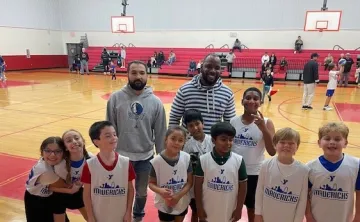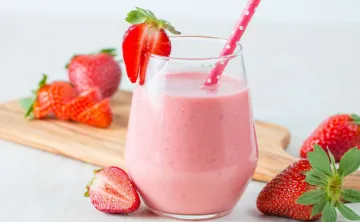Have a Y story to share? We'd love to hear it!
Featured

2025 in Review: Strengthening North Texas Together
In 2025, the YMCA of Metropolitan Dallas expanded its impact across North Texas through facility growth, life-saving and wellness programs, signature community events, and record-breaking generosity.All articles

When Care and Community Come Together in Youth Sports
Through YMCA basketball and care from Scottish Rite for Children, families across North Texas are supported both on and off the court. One YMCA coach’s family experienced this connection firsthand, of
Strawberry Smoothie: A Simple and Nutritious Drink
This Strawberry Smoothie is a creamy and refreshing option for breakfast, snacks, or post-workout fuel. With only three ingredients, it is a quick way to get protein, calcium, and fruit into your day.
Joan Celebrates 100th Birthday at the Moody Family YMCA
Joan, a 30 year member of the Moody Family YMCA, celebrated her 100th birthday on Tuesday, February 4 at the Moody Family YMCA. She shares that the secret a long life are wine and chocolates.
7 Science-Backed, Guilt-Free Reasons to Take a Brain Break
Our mental wellness collaborative partner, Center for BrainHealth, provides us with resources that talk about the importance of brain breaks and how to take a brain break. A brain break is a purposefu
Small Steps, Big Impact: Take care of your Heart Health this February
This American Heart Month, the Y is helping you take charge of your heart health, one heartbeat at a time. February is American Heart Month, and we are here to help you show your heart some love.
Over Fifty Years of Service to the Park Cities/Moody Family YMCA
Water group exercise instructor, Brenda Heckmann, shared her 50+ year journey with the YMCA. Her passion led to the creation of the first women's group exercise class at the Park Cities YMCA.Dallas, TX (February 10, 2026) NBC DFW - We are celebrating a birthday 100 years in the making and a fitness journey that is something good. WATCH NOW
Dallas, TX (December 30, 2025) NBC DFW - Area gyms offering incentives to jump start New Year's resolutions READ MORE
Rockwall, TX (December 29, 2025) Blue Ribbon News - New Year’s Fitness Resolutions Tips from the YMCA READ MORE
Rockwall, TX (December 23, 2025) The Rockwall Times - Simple, Sustainable Fitness: A Local Trainer’s 4 Rules for a Healthier New Year READ MORE
Dallas, TX (November 27, 2025) WFAA - Dallas Turkey Trot brings thousands to downtown WATCH VIDEO
Dallas, TX (November 27, 2025) WFAA - Thousands of runners gathering for Dallas YMCA Turkey Trot READ MORE WATCH VIDEO
Dallas, TX (November 27, 2025) FOX 4 - Annual turkey trots in Dallas, Fort Worth are a Thanksgiving tradition READ MORE
Dallas, TX (November 6, 2025) KERA NEWS - Arts & Culture - North Texas Turkey Trots for you and your flock READ MORE
Dallas, TX (September 30, 2025) D MAGAZINE: Nurturing Minds Today to Power the Workforce of Tomorrow READ MORE
Rockwall, TX (August 18, 2025) Rockwall YMCA undergoing major renovation as DFW grows, $500,000 gift from HomeBank READ MORE
Rockwall, TX (August 5, 2025) Diving into Competition: YMCA Lone Star Swim Meet celebrates athleticism and the spirit of teamwork READ MORE
Richardson, TX (July 21, 2025) CBS News Richardson celebrates NBA rookie Liam McNeeley's debut and rising stardom WATCH THE STORY
Richardson, TX (July 2, 2025) CBS 11 North Texas native Liam McNeeley drafted by Hornets, honors family roots and basketball passion WATCH THE STORY
Graford, TX (June 19, 2025) NBC 5 DFW: Historic YMCA camp at Possum Kingdom Lake getting a makeover READ MORE
Graford, TX (June 19, 2025) MINERAL WELLS AREA NEWS:Camp Grady Spruce Renovations - Footage from Dallas YMCA WATCH THE REEL
Graford, TX (June 19, 2025) MINERAL WELLS AREA NEWS:$10.2M project adds cabins, dining hall, equestrian facility, and welcome center READ MORE
Dallas, TX (June 4,2025) NEWS RADIO 1080 KRLD: After increase in child drownings in 2024, YMCA & Reliant team up for water safety lessons READ MORE
Dallas, TX (June 4, 2025) CBS NEWS: YMCA offers free swim lessons across North Texas for water safety READ MORE
Dallas, TX (May 30, 2025) Fox 4 News: Fox 4 News announces registration opening for Turkey Trot WATCH NOW
Dallas, TX (May 26, 2025) Telemundo DFW: Campamentos de verano en el Metroplex MÁS INFORMACIÓN
Grand Prairie, TX (May 26, 2025) NBC 5 DFW: Grand Prairie city councilman Junior Ezeonu is taking swim lessons at 25 years old through the YMCA of Metropolitan Dallas. READ MORE
Grand Prairie, TX (May 24, 2025) SPECTRUM NEWS: Practice water safety for yourself when around water this summer WATCH THE INTERVIEW
Dallas, TX (May 9 -15, 2025) WHITE ROCK LAKE WEEKLY: Pilot program to provide mental health help for youth READ MORE
Dallas, TX (May 6, 2025) FOCUS DAILY NEWS: Addressing youth mental health crisis: YMCA Dallas & health experts introduce vital new program READ MORE
Dallas, TX (May 6, 2025) ADVOCATE LAKE HIGHLANDS: Lake Highlands neighbor recognized by YMCA of Dallas READ MORE
Waxahachie, TX (May 5, 2025) WAXAHACHIE SUN: YMCA of Metropolitan Dallas honors Waxahachie volunteer READ MORE
Dallas, TX (April 21, 2025) BLUE RIBBON NEWS:YMCA of Metro Dallas honors 23 volunteers, including Rockwall recipient, at 139th annual celebration READ MORE
Coppell, TX (April 21, 2025) COPPELL GAZETTE: North Texas volunteers honored by YMCA of Metropolitan Dallas READ MORE
Dallas, TX (April 10, 2025) THE HUB: Dallas ISD students are diving into something new – learning life-saving water safety skills READ MORE
Dallas, TX (March 12, 2025) CBS TEXAS: Jennifer Federici, chief brand officer of the YMCA of Dallas, spoke about the importance of serving the community and the impact of the YMCA READ MORE
Dallas, TX (November 1, 2024) THE DALLAS MORNING NEWS: On your mark, get set, trot! Lace up for the Dallas YMCA Turkey Trot on Thanksgiving Day READ MORE
Dallas, TX (October 28, 2024) DALLAS BUSINESS JOURNAL: Dallas area leaders tackle workforce, transportation and child care challenges at annual YMCA luncheon READ MORE
Dallas, TX (October 9, 2024) BLUE RIBBON NEWS: YMCA of Metropolitan Dallas & Cars for Kids hold a presentation of wrapped van donation READ MORE